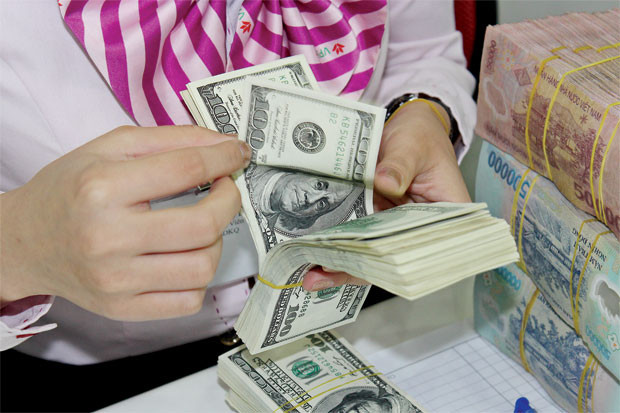“Tightening” the foreign exchange market
The Ordinance amending and supplementing a number of articles of the Foreign Exchange Ordinance, which is about to be passed, will have many provisions tightening this activity.

Illustration photo (Internet source)
It is expected that in the 16th session taking place from March 19, 2013, the National Assembly Standing Committee will pass the Ordinance amending and supplementing a number of articles of the Foreign Exchange Ordinance with many provisions further tightening this activity.
According to Chairman of the National Assembly's Economic Committee Nguyen Van Giau, the promulgation of the Ordinance amending and supplementing a number of articles of the Ordinance on Foreign Exchange will significantly contribute to resolving the "dollarization" and "goldenization" of the economy, while creating unity and synchronization among legal documents, enhancing the effectiveness of state management of foreign exchange activities.
“Currently, some contents of the Foreign Exchange Ordinance are no longer consistent with relevant provisions of later draft laws such as the Investment Law, Securities Law... especially the Law on Credit Institutions and the State Bank Law, for example, provisions on foreign direct investment and indirect investment in Vietnam, foreign exchange belonging to the State budget...”, Mr. Giau said.
The Chairman of the Economic Committee also said that it is necessary to create a synchronous and unified legal framework to resolve the situation of "dollarization", moving towards eliminating the use of foreign currency as a means of payment. Therefore, the Economic Committee agrees with the draft Ordinance amending and supplementing the activities of quotation, valuation, price recording in contracts, agreements and other similar forms of residents and non-residents not to be carried out in foreign currency, except in cases permitted under the regulations of the State Bank.
In the recent discussion to gather opinions on this Ordinance of the Economic Committee, many delegates agreed that with the current socio-economic conditions of our country, foreign exchange should be considered a national resource and should be used economically.
“Vietnam has not yet reached the period of loosening foreign exchange management and this resource needs to be managed as a national resource,” said Dr. Tran Du Lich, Deputy Head of the National Assembly Delegation of Ho Chi Minh City.
Giving a comparison, every year, tens of millions of Vietnamese farming households have to work day and night to export a few billion USD to bring back to the country, while the amount of foreign currency flowing abroad for education, medical treatment, buying houses... is also equivalent, Mr. Lich stated his opinion: "Foreign currency bleeding is a very big problem. Therefore, foreign exchange must be managed as an issue related to the national balance, it cannot be easily liberalized in the current period".
Economic Committee member Tran Hoang Ngan recommended that the early completion of the draft amendment to the Foreign Exchange Ordinance would help stabilize the foreign exchange market, especially at the present time when the black market USD is showing signs of "surging" again. However, this amendment needs to be detailed and clear, avoiding ambiguity that makes it difficult for those who implement it.
The Foreign Exchange Ordinance was issued in 2005. Basically, this Ordinance has completed a step of legal regulations on foreign exchange management, creating favorable conditions for credit institutions, enterprises and people in foreign exchange activities. However, the developments in the foreign exchange market and economic fluctuations in recent times, along with the impact of the global economic crisis, have required strengthening the management and control of foreign exchange activities of organizations and individuals.
In that context, some contents of the Foreign Exchange Ordinance are regulated quite loosely, liberalized or have no clear regulations, so they do not ensure the effectiveness of management and regulation by the State Bank.
For example, some provisions of the Foreign Exchange Ordinance are no longer suitable to the reality of the Vietnamese economy and financial market in terms of capital capacity and management capacity, risk control of financial institutions, economic organizations, growth quality, efficiency and competitiveness...
The Ordinance was issued in late 2005, so it is difficult to foresee the negative impacts of the global financial market when it falls into crisis on the domestic market and the impact on the management and regulation efficiency of the State.
Or for the current "hot" reality of the dollarization of the economy, although the Foreign Exchange Ordinance has stipulated cases that cannot be performed in foreign currency, this regulation does not fully cover the acts that are not allowed to use foreign currency that are arising in reality (quoting, pricing, signing contracts of residents...), causing difficulties for management and creating legal loopholes for some violators for whom the authorities do not have a solid legal basis to handle violations.
Commenting on this draft Ordinance, the Ministry of National Defense proposed further research to amend the content on state management in the field of foreign exchange.
Accordingly, the State has unified management, but it is necessary to stipulate a mechanism for close coordination between relevant ministries and branches in this field, avoiding the "dollarization" of the economy, through implementing the principle of publicity and transparency in foreign exchange management activities, the country's foreign exchange reserves, building trust and creating habits among agencies, organizations and people in using Vietnamese currency./.
According to (vov.vn) - LT






